It’s My Life
- Dum Dum Girl
- Such a Shame
- Renée
- It’s My Life
- Tomorrow Started
- The Last Time
- Call in the Night Boy
- Does Caroline Know?
- It’s You



Kim Magazine: 22nd January 1983
If any of the guys in Talk Talk should ever have any problems then vocalist Mark Hollis should be able to sort them all out. That’s because he studied psychology at university for one and a half years.
“But it was really boring” he says. “I thought when I decided to do it, that it would be a fascinating subject to learn, but most of the stuff didn’t really measure up to what I’d hoped for. To be quite honest, they might use a lot of long words, but it all adds up to pain common sense! So I decided to lave and get a job! Because although I’d gone in for a bit of a academic life, I really wanted to be in a group!”
After he left university he went to work as a laboratory technician which he found was equally boring. “I could never wait to get home and start writing songs and lyrics” he says. “All day long I’d be jotting ideas down on bits of paper and just waiting for the moment when I could put it all down on tape!”
He had a good incentive in his older brother. “He’d managed pop groups and I’d watched him at work and thought it all very exciting. Especially when I got to go to the theatres where the groups were playing and I managed to meet them and talk to them about the pop business.”
“I was determined that it was all I wanted to really do!”
“ The group, Talk Talk, came into existence purely coincidentally. “I just got Simon Brenner, Lee Harris and Paul Webber (sic) to join me for a few days whilst we made some demo discos of my songs to take to a record company” says Mark. “But we liked what we were doing so much that we decided to throw every penny we had into hiring a rehearsal room and practicing to go out and play in the clubs.”
They got their recording contract and since then, their album has been in the charts for about nineteen weeks, which is not bad going. Plus a hit single too! But curiously, it isn’t Mark’s brother who manages them. What did excite the group, however, was playing with Elvis Costello in America. “That was really something. He’s such a great performer” says Lee. “We liked his songs and the kind of audiences that he attracted.”
The fans have really taken to the group and Simon says “we got a lot of letters from girls and they’re all beautifully written. Somehow we don’t seem to get the usual fan mail about what colour underwear we buy and things like that. It’s really nice to get an intelligently written letter. Although we don’t mind the others. They can provide a good laugh when we’re travelling or stuck in our dressing room.”
They also admit that playing in America was quite an experience in terms of size of audience.
“In Britain, the most we’d played to was in the hundreds, but over there we were in stadiums that held around 10,000 people. It can be quite mind blowing to go out on stage and just be presented with a sea of faces.”
Mark reckons that the group has some kind of guiding spirit. “Although we don’t believe in the supernatural and things like that” he says “I don’t think I’ve even had my fortune told by anyone. But I wouldn’t want to know anyway! But it does seem that whatever we want, we seem to get. Like I wanted a certain record company, and we were signed to them. Then a particular producer, and he happened to be in American, so I knew that dream was out. But no sooner had I uttered the words to the guy at the record company office then in walked the same producer. I couldn’t believe it.”
“Apparently he’d just arrived from American can come straight to the company office. What’s more, he agreed to do our album for us straight away. We all thought that this was incredible. Then the hit album. So I do believe to some degree I the power of destiny!”
Mark and the rest of the guys also enjoy going to the cinema and watching television when they get the chance.
“We love comedy programmes on television and musicals at the cinema. In fact if I’d had the chance to appear in any film that has ever been made I would have loved to have done the Gene Kelly role in ‘Singing in the Rain’. I think it was one of the best films ever made. I’ve always had this secret dream of being in a deserted street when it’s pouring with rain, holding an umbrella and doing that dance sequence that Kelly did.
“That might sound crazy, but I don’t think that I’m alone in this fantasy. I’ve met quite a few people who would love to be able to do the same thing! Nobody seems to know why, but it’s the scene from the film that sticks most in the memory. I must’ve seen that picture a dozen time or more and I never seem to get tired of it!”
Talk Talk are also beginning to love the idea of travelling around the world. A lot of bands tire of the planes, the hotels and the long flights, but this group enjoy it!
“None of us are the type who like to sit around doing nothing” says Paul. “Apart from touring around America, which was quite an experience because each State is so different of the one before it, we have been right round to the Far East. It’s funny in America, because you kind of get Los Angeles and New York, which everyone knows about, and this huge bit in the middle. Those are the toughest places to play because they don’t hear as much of you there as they do on the east and West Coasts.”
“Japan is something else. You really have to visit the place to believe it. The fans are unusual too in that they are quite fanatically devoted to the groups…even if they’ve not heard them play of seen them at all. They can become great fans and send you letters just from seeing your pictures in Japanese pop magazines. And there’s not a lot that their magazines ever don’t include.
“But they can also be very reserved. They’ll often seem serious and then the next moment be screaming just like fans in Europe. It’s quite weird. But it’s a lovely country and a fascinating place to visit. Next time that we go there we hope to be visiting Australia too. We haven’t been there yet!”
The group are now working on ideas for a new album and Mark says” I still can’t break from the habit of scribbling down lyrics on odd bits of paper where ever I am. It must be something that stuck, with me from those days when I worked as a lab technician. Although I do tend to have a tape recorder with me now, which helps things al lot!”
Watch out for them, Talk Talk are going to be big business!
^ go back to topSmash Hits: 17th March 1983
Talk Talk take off again with a new single ‘My Foolish Friend’, a new album ‘A Chameleon Hour, which should appear in May and a new line-up. Out goes Simon Brenner and in comes Phil Ramacon who played with the group on their UK tour last year.
^ go back to topSmash Hits: 17th March 1983
Oh the pain of being a member of Talk Talk! The starched shirts, the meaningful expressions, the dry ice, the anguish, the adenoids, not the mention the snide reviews!
^ go back to topRecord Mirror: 9th April 1983
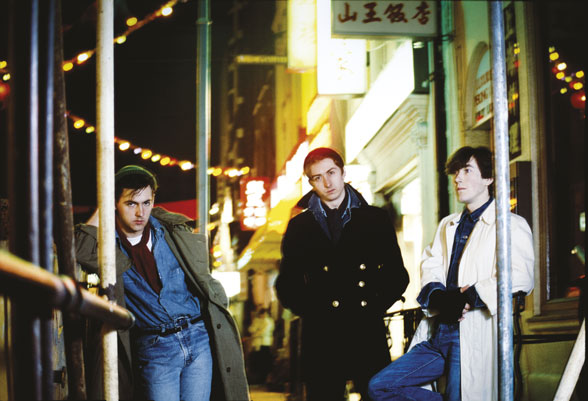
On a normal day, Essex based club lover Paul Webb is the easy-going bassist in Talk Talk. But when there’s a full moon (or a full glass) the spectre of Dougie returns to haunt jelly-knee’d witnesses. This terrifying alter ago, so far only experienced by fellow Talkers Mark Hollis and Lee Harris on tour in America scare even the mild-mannered Paul.
I suggest they let Dougie loose on the still large number of critics who won’t even give Talk Talk the benefits of a fair hearing. Their poignant new single ‘My foolish friend’ has garnered the usual tedious ‘plastic pap’ and ‘Duran imitators’ type reviews. Ensconced in the leisure area of a studio deep in Surrey, Talk Talk tried to rationalise this irrational attitude. Paul launches his tirade.
“Some people think we’re this instant pop band that’s really lightweight but I can’t hear it at all. They’ll be in for a shock with the next album, ‘cos a lot of the arrangements aren’t what a pop band would do at all”
But Mark still wasn’t confident of a fair trial “I think I can say in all safety that journalists won’t give the album a fair listening. Everyone’s entitled to their opinion even if they are wrong.. I was so used to doing interviews and getting so grossly misquoted that I lost faith in it. Like with the early Dexy’s thing, not talking to anyone., I thought that was totally out of hand, but I began to sympathise, and now it really doesn’t bother me. I’d be totally happy getting interviews set up with all the people who really hate us and I’d just fight them”
Having reconciled himself to the inevitable “negative vibe’ Mark is actually a happy man now, as he’s working with his dream producer, the knob-twiddler behind Roxy Music, Rhett Davies.
Mark: “I’m really lucky, ‘cos I really rate Rhett. Things actually are exciting and we can get art into it somewhere down the line, know what I mean? I think we’re getting across what we wanted on this album”
“We’re introducing a lot of different things - we actually made the grade and put a bit of guitar on today, the first we’ve ever player - although it’s only feedback!. That first album was 90% synth., but now we’re covering a lot of new ground - lots of acoustic piano, fretless bass, using the jazz side of it more openly.”

Mark’s Otis Redding-style influences have been well documented and now they’re surfacing with the aid of new keyboard player Phil Ramacon, who’s played with Paul McCartney amongst others. AS a result, the new 45 “My Foolish Friend’ has a richer feel. Mark agrees. “In a lot of ways it’s as simple as the early stuff was, but there’s just a bit more variation happening, you can hear what all the instruments are trying to do instead of having wall of sound”
Paul “Soundwise, it’s far superior to anything we’ve done. Phil’s keyboard style comes from a funk area, and he’s injected a lot of life into it”. The video accompanying the single is set in Halifax featuring queues of the sullen unemployed men and bleak grey industrial landscape, really moody social comment, man. Mark seems to have a problem seeing the brighter side of life. So are we in for a depressing album?
Mark “My songs are observations on things that happen to me - that video’s meant to be poignant. Buy there’s going to be a fair amount of variety I’d expect, I’ve really been considering trying to write a lyric that wasn’t depressive but it’s quite hard!”
The feel may remain reflective but the idea behind ‘The Chameleon Hour’ is quite intriguing. Mark explains : “it’s inspired by the book ‘The Dice Man’ which is about decision making through dice throwing. Although they didn’t actually refer to it in the book, there’s a scene when he’s in party for an hour undergoing about ten different personality changes and that idea seemed quite appropriate in terms of what we’re doing. It’s a fabulous book, the idea is so appealing. I’ve just written ten times as many lyrics as I needed and thrown the dice on which ones go in. It’s ultimately wrong though, definitely immoral!”
This ‘hands of fate’ business sounds suspiciously close to the methods once used by Brian Eno who had a set of cards to tell him what to do. Not surprisingly Rhett Davies knows all about these.
Mark “Yeah, ‘Oblique Strategies’, Rhett was telling me about them - if you’re going to do it, you’ve got to do it. If it says you vocal’s useless, you take it off. The only problem is if it says ‘make a three album boxed set out of one track’ then you’re in trouble. I was told what one of those cards actually was - something ridiculous like ‘pursue the meaning and find the truth’, it was really over the top!”
So does this mean the next TT elpee is going to be wildly schizophrenic? Paul (or is it Dougie?) has the last laugh: “It’s going to be really dicey!”
^ go back to topRecord Mirror: 21st January 1984
Ere, Didn’t you used to be in Talk Talk? It’s a question Mark Hollis and Paul Webb have got used to in the last year or so. Talk Talk summed it all up with their last hit, a little number which graced the charts in 1982 called ‘Today’.
Their new hit, “It’s my Life’ is a cunningly catchy little number, but then it should be if it took a year to produce. “We’ve spent the last year in the studio making the new album” says Mark. “We’ve had to be very patient and it’s quite amusing really when people ask us if we used to be in Talk Talk.”
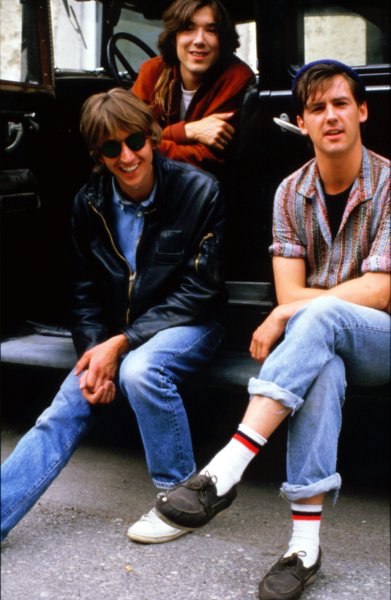
So why does it take so long to bring out a record in these days of hi-tech? I mean, you don’t have to hand cut the groves yourselves, do you? “well, the most important thing to me is that if, at the end of the day the song’s good then it’ll all go through OK” says Paul. “We just wanted it to be right when we released another single and album, too many bands rush out their follow up in two months time or something.
“we wanted some animal noises on the record so we sent our road manager up to Regent’s Park zoo with a cassette recorder and said ‘Come back with some animal noises’ sais Mark. “When he came back the tape had things like ‘no, you’re not having an ice cream’ on it, so we abandoned that idea and created the noises in the studio. On the album we’ve got a coupe of elephants and a llama popping in an out.
The video which accompanies the single is an intriguing display of wildlife footage, unlike anything you’ve ever seen on a pop video. Mark and video supremo Tim Pope spent hours wading through footage of the BBC’s ‘Life on Earth’ series and the results are refreshing to say the least. It’s just like starting over for the band in many ways, and even though they don’t consider they’ve ever been away, they have a hard job convincing some people. “we did this TV show last week and they treated us like a new band” says Paul “not at all like a band who had hits in the past. I suppose it’s like the first time didn’t happen at times and this is a fresh thing altogether.”
Mark and Paul are still as convinced as ever about their contribution to a music scene they don’t greatly admire. They believe totally in what they’re doing and if that means that they have to step off the pop treadmill for a year or so then that’s fine by them. Their current hit with ‘It’s my Life’ has proved they can still deliver the good and preserve their own dignity and high standards. (Andy Strike)
^ go back to topRecord Mirror: 25th February 1984
Talk Talk are probably really nice geezers. Like a drink, good to their mums, maybe even go to football. Good blokes. EMI like ‘em too. Because they can play their instruments and they comb their hair and they write songs with a smattering of tune and they write words that say precisely nothing. EMI must like ‘em - look, they’ve let ‘em make another record. Another record to go with the Private Lives records and the Re-Flex records that EMI seems to bloody adept at excreting on Mr Pop Punter.
But that’s not to say Talk Talk are rubbish. Talk Talk aren’t rubbish. Talk Talk are just crushingly, excruciatingly average. There is absolutely nothing to distinguish them. No edge. No identity. Talk Talk are Duran without the lust for success, Roxy without the sloe-eyed style, Tears for Fears without the suicidal touch. But gloomy they are! ‘It’s my Life’ is just one long negative river of regret, a gluttony of guilt, a tribute to torpor. When Mark Hollis gets emphatic, as on the title track or broody in ‘Such as Shame’ or kooky in ‘Call in the Night Boy’ the reaction is always the same. Shuddup bore! I’ll never listen to It’s my Life again.
^ go back to topSmash Hits: 1st March 1984
For those who still like this kind of thing, Talk Talk are yet another synthesised white pop group, complete with singer who wants to be Bryan Ferry. Memo to Talk Talk - if you want some success, change your style and start jangling some acoustic guitars (4 out of 10).
Josephine Hocking
^ go back to topSounds: 1984 exact date unknown
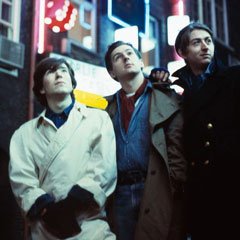
It seems to be that time, the time when bands who didn’t quite make it last time round, despite being tailor-made for one particular genre, set out to redress what they no doubt see as a cruel injustice. The reality is that they didn’t have anything spectacular then, and they don’t now. Talk Talk are a fine example of this; of a band awash in mediocrity yet who have the occasional flash of inspiration to produce a song just here and there that will keep your interest alive.
They did it last time with ‘Talk Talk’ and ‘Today’. They’ve done it here with the title track, ‘It’s my Life’. And apart from that, this album merely sounds like a strange hybrid of China Crisis and Soft Cell, yet with a lack of the subtlety and panache of either. On occasion, Mark Hollis’s vocal can just through, and this is usually on the more atmospheric tunes like “Tomorrow Started’ which employs a more Ultravox (even Genesis) like inspired atmospheric. And it suits them fare more than the rather aloof, high-handed approach of the more mundane tracks on this album. Tal Talk really are just fine for a dinner party background perhaps, and the occasionally sparkling single. But they don’t look about to set the 80s on fire. (Carole Linfield)
^ go back to topSmash Hits: 17th March 1984
Video director Tim Pope, who makes videos for people like Soft Cell and The Style Council, has made a video of himself singing a ditty of his own. With a little help from his friends of course. ‘I want to be a tree’ is the rather silly and catchy song. ‘It’s meant to be banal’ he says ‘A joke against me’. He reckons that, particularly in America, video directors are beginning to get practically as much attention as the stars of their videos and wants to deflate that.
In his video Paul Young, The Style Council, Siouxsie and Budgie, Talk Talk, The Cure and Marc Almond are seen ‘spontaneously reacting’ to Tim’s song. Marc Almond clings to Tim and sings along. Weller and Talbot snigger. ‘I think all the reaction represent the people quite well’ says Tim; ‘I mean you’d expect Siouxsie to hit me with an umbrella’. Needless the say record companies are now clamouring to sign up Tim and his song. And, as he puts it ‘That’s an even bigger joke’.
^ go back to topMelody Maker: 17th March 1984
Whatever happened to Talk Talk ? You must remember them, a rather faceless band who had two medium-sized hits with “Talk Talk” itself and “Today”, and then disappeared from sight, squire.
It is now well over a year since the dancefloors of the nation reverberated to the aforementioned tunes, and bar the very occasional live show, one could be forgiven for thinking that the Talk Talkers had shut up for good. Not so, Mark Hollis and his cohorts now have a rather fine new album in the shops, and are currently undergoing some rather frenzied rehearsals for an imminent British tour.
Welcome back to the game lads, but where on earth have you been?
“We’ve just been getting the album together really,” explains main man Hollis “making sure that it would be a significant development from the first one. The business of being out of the public eye doesn’t really worry us, because all that is important is that we get the product right, and yeah, we’re definitely very happy with it.”
Bassist Paul Webb confirms that Talk Talk are a band more concerned with music than image.
“We just never got caught up with all that business of getting your face in the magazine, the sort of here’s the face, here’s the image, and, oh by the way, here’s the music sort of attitude. We reckon that as long as the music’s good, then everything else will follow.”
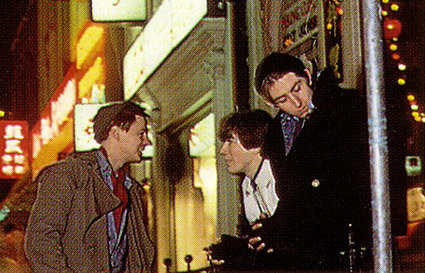
This somewhat quaint approach to selling your wares might just have something to do with the fact that Talk Talk are perhaps the classic case of a band without a ready-made market.
“Yes,” agrees Hollis, “we are a pretty hard act to define. Really the only thing that you can safely say about us is that we always work around orthodox song structures. Apart from that we draw our influences from all different sorts of music, and never just the one thing.”
“Like for example, On ‘Tomorrow Started’, the intro reminds you of Erik Satie, the verse is maybe closer to Pharaoh Saunders, and then the sort of Marvin Gaye rhythm vibe comes in. And all that is just a reflection of the fact that my whole life has been one long process of being into lots of different types of music. Pink Floyd, King Crimson, John Lee Hooker, The Standells, Chocolate Watch Factory, everything through to Shostakovich and Prokofiev.”
This excellent list brings about two immediate reactions in my bemused little brain. One, that sinking feeling of wasted days in the college of music reasserts itself; and two, it’s surely little wonder that Mr Hollis and his band find themselves so much out on a limb.
“I guess we are very much against the grain at the moment,” he says, “but then we have never really been part of a distinct movement. The first album was probably quite close to post-punk new wave, and we were definitely keen to get across a feeling of energy, but then, as far as I was concerned, all that was taken a bit too far by other people, and moved away from working within the structure of songs. “What we are doing on the new album is not to use chords to block things, but instead give everything a lot more room to develop. And hopefully the next album will be just as different again.”
It will surely be in the live sphere, however, where this band will win over any new supporters, and here Hollis promises a significant change from the last set of public outings.
“It will be very different this time, because we are now actually a six-piece band for live purposes. No way will it just be a straight duplicate of the album, as there are going to be a lot of new ideas in there as well, as I can quite easily see songs stretching out to 10 or 15 minutes, no bother.”
Now that would certainly be interesting, and is probably just the sort of extreme gesture needed to galvanize the listening public, and move Talk Talk away from their current position of being seen and heard as the very essence of blandness.
Whatever happened to Talk Talk? Now’s your chance to find out.
^ go back to topRecord Mirror: 31st March 1984
Chrissie: You get a free single with their demos on, which I think’s really good for their fans. And I like the song. I hope it’s a hit.
Lee: I can see it being a hit but that type of music that’s going about the charts at the moment makes me think it could miss. It hasn’t got that crucial dance sound that’s sweeping the state of the nation. It’s a good song and well sung.
^ go back to topHumo: 12th April 1984
Denkt u vooral niet dat deze plaat onschadelijk is!
Bijna was ik te laat. Bij wijze van experiment Bo (de rockendste herder ter wereld; zijn pels zit dag en nacht onder de Brylcreem) even alleen gelaten terwijl Talk Talk door het huis zweefde, maar gelukkig nét op tijd thuisgekomen om hem van de vensterbank te hijsen.
De single 'It's my life' kent u ongetwijfeld: krijsende flamingo's, een voorzichtige ritmesectie, 42 treurende synthesizers en vooral het gejammer van Mark Hollis, de man die de doodsrochel met de lokroep van de bronstige sneeuwhaas wist te combineren en er een platencontract aan overhield. Die single blijkt het vrolijkste nummer op de elpee te zijn, de overige negen melodieën moeten het met iets minder joie de vivre stellen: tonnen treurnis, door Hollis met veel valse Weltschmerz op de band gejankt, ondersteund door het Orkest van Snikken en Snokken.
Uw lief ervandoor? Uw auto gestolen? Iemand is uw liquor uit een old fruit jar aan het drinken. Blijf dan vooral uit de buurt van deze plaat! Zoniet, dan na beluistering koffie en koeken op tafel en Tele-Onthaal gebeld. Bo, blijf van dat scheermes!
^ go back to topSmash Hits: 12th April 1984
Talk Talk are no chumps when it comes to creating atmosphere” ghostly swishing sounds build up to a chorus that Mark Hollis’s quavering voice plants in the brain for evermore (well, the next hour or so). Tom Hibbert
^ go back to topThe Standard Recorder: 13th April 1984
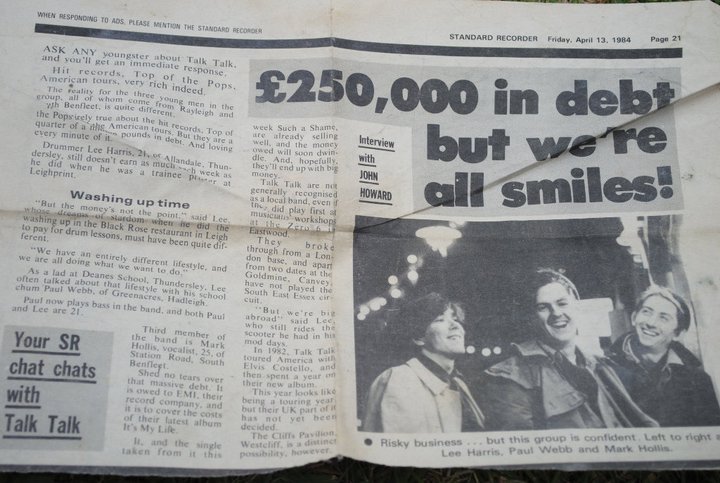
Ask any youngster about Talk Talk and you’ll get an immediate response.
Hit records, Top of the Pops, American tours, very rich indeed.
The reality for the three young men in the group, all of whom come from the Rayleigh and South Benfleet, is quite different.
It’s entirely true about the hit records, Top of the Pops and the American tours. But they are a quarter of a million pounds in debt. And loving every minute of it.
Drummer Lee Harris, 21, of Allandale, Thundersley, still doesn’t earn as much each week as he did when he was a trainee printer at Leighprint.
Washing up time
“But the money’s not the point” said Lee, whose dreams of stardom when he did the washing up in the Black Rose restaurant in Leigh to pay for drum lesions, must have been quite different.
“We have an entirely different lifestyle, and we are all doing what we want to do”
As a lad at Deanes School, Thundersley, Lee often talked about that lifestyle with his school chum Paul Webb, of Greenacres, Hadleigh.
Paul now plays bass in the band and both Paul and lee are 21.
Third member of the band is Mark Hollis, vocalist, 25, of Station Road, South Benfleet.
Shed no tears over the massive debt. It is owed to EMI, their record company, and it is to cover the costs of their latest album ‘It’s My Life’.
It, and the single taken from it this week, ‘Such A Shame’ are already selling well, and the money owed will soon dwindle. And hopefully they’ll end up with big money.
Talk Talk are not generally recognised as a local band, even if they did play first at musicians workshops at the Zero 6 in Eastwood.
They broke through from a London base, and apart from two dates at the Goldmine, Canvey, have not played the South Essex circuit.
“But we’re big abroad’ said Lee, who still rides the scooter he had in his mod days.
In 1982 Talk Talk toured America with Elvis Costello and then spent a year on their new album.
This year looks like being a touring year but their UK part of it has not yet been decided.
The Cliffs Pavilion, Westcliff, is a distinct possibility however.
^ go back to topNME: 12th May 1984
Talk Talk really bring home the meaning of totally, totally unexceptional. The curious, curious ones are down the front waiting for the arrival of the Live Act, lusting after entertainment like waiting for a circus, or watching some crappy TV game show or a movie where the girl dies of leukaemia at the end or anything as long as it’s not anything directly to do with them. Not that they get much humiliation, hurt or happiness out of Talk Talk, a band who engender such awe-inspiring words such as ‘competent’, ‘bland’ and ‘quite catchy’. For the rest Talk Talk seem to be as interesting an entertainment as going for a curry after a few pints - just another ingredient in A Good Night Out. I can’t imagine anyone going just to hear the music.
The lead singer is a closet cowboy boot wearer if ever I saw one. He has hippy hair, dark glasses and a cravat under his denim shirt which says - Look! I’m just the same as you, but, I’m a popstar.
Guess what they played. Tracks from the new album ‘It’s my Life’ like ‘Caught in the night’ and ‘Dumb Dumb Girl (and that it really, really! The lyric) and for entertainment, I said entertainment value, the hit singles ‘Talk Talk’, ‘Such a Shame’ and ‘Today’ As encores. Talk Talk. You can spell it blah…or bleugh.
^ go back to topElectronic Soundmaker & Computer Music: July 1984

Talk Talk have kept a low profile since the release of the debut album ‘The Party’s Over’ in 1982. Their original keyboardist Simon Brenner departed quietly in 1983, the band remaining members, Mark Hollis (vocals), Paul Webb (bass) and lee Harris (drums) electing to stay as a three-piece. The group, augmented by a guitarist and two keyboard players, were rehearsing at Norris Studios for their forthcoming British tour when I arrived, unexpected, to disrupt them. Mark Hollis, besplendent in a blue marks and Sparks jersey, held out his hand cautiously, a past victim of more unscrupulous hacks.
So tell me, Hollis, how did you get your record deal?
“I had just got a song writing deal and Ed (Mark’s brother, from Eddie and the Hot Rods) had met Lee and Paul and he suggested, y’know, would they like to come up and work with me for a few days. Simon was through a friend…he just said ‘I know someone who plays piano’ and it worked out very well.”
“We went into a rehearsal room for six months to get the numbers well arranged, well put together and everything ‘cos with the repercussions of the punk movement, record companies were so wary of signing anything that it was quite apparent that you had to be more selective about the way you did it. We did some demo tapes with Jimmy Miller (who’d done production work with the Stones and Spencer Davis amongst others), put those out to record companies, did a couple of gigs, got offered a David Jensen thing and that was it, really. We got the deal on the strength of a few live gigs, the demo tape and the radio session.
Great Expectations
Talk Talk signed to EMI in 1982 amidst great commotion. Despite being promoted as ‘the next Duran Duran’ Talk Talk fever proved to be non-contagious. Is there a sense of disappointment at EMI that you haven’t really cracked the British and American markets yet?
“Look, as far as I’m concerned, the only reason those comparisons were ever put forward by EMI was on the fact that they thought we were going to be very big”
Webb: “we never saw ourselves as being flavour of the month”
Did they?
“No, no really. That’s why were signed with them – it was like a long term project. The press, they thought, y’know, EMI…EMI’s got this tag, y’know.” With any mention of the music press Mark gets agitated: “the press have a very heavy hang-up with EMI which we don’t have. As far as I’m concerned, they are letting us make records the way we want to make records – they’ve totally supported us the whole last year to come you with an album they have no guarantee will sell. That first album was y’know moderately successful, but nothing more than that. All I’ve ever wanted from this thing is to make good records and they’re allowing us to do that.”
After The Party
The band’s debut album, ‘The Party’s over’ spawned two hit singles. ‘Today’ and second time around “Talk Talk’. How do you see it now? Mark: “It was to work along the lines of the end of the British New Wave – y’know, energy, enthusiasm and simplicity. It was like just walking into a studio and playing what we had already worked out. In a live situation you’re covering a lot of space with sound y’know”.
Webb leans forward as if to confess. Suddenly I am the Father and he is One Who Had Sinner. “We’d barely been in a studio…it was the first serious recording we’d ever done. Looking back on it, it feels a bit dated but it had the energy and that’s what Talk Talk was all about at the time.”
Following the band’s first US tour of duty, Simon Brenner left. Why did he leave? Did he fall or was he pushed. We want information, information…Harris, The Quiet Man speak: “Er…musical differences.” I cannot help blanching at this stunningly original quote. Care to elaborate, Hollis? “Each album should be a definite move on from the one before it. No y’see some people understand that and other people don’t. Some people think that if you have a git with something like ‘Today’ then what you should do is maintain that style and that will ensure more hits right?” Come on Hollis, stop hedging…anything to add Webb? “It was just obvious that it wasn’t working with him. He’s still our friend and everything, but I haven’t seen him for over a year…”
The Meaning Of ‘Life’
Talk Talk’s new album ‘It’s My Life’ is a much more varied and complex album than ‘The Party’s Over’ partly because of the band’s great5er maturity and Hollis’s undoubted song writing talents, but largely one suspects as a direct result of Tim Friese-Green’s stunning production, a refreshing change from Colin Thurston’s routine work on their previous records.
“The main reason we used him was that he’d done three singles that we knew of at the time which was Tight Fit “the Lion Sleeps Tonight’, ‘Cry boy Cry’ Blue Zoo and Thomas Dolby ‘She Blinded Me With Science’. What was good about him was he’d just produced three records that were in totally difference areas of music all very well and he hadn’t imposed a production sound on any of them. You get producers like Spector or Steve Lillywhite and you know that producer in a lot of cases before you know who the band is. And he was obviously someone who was really good at listening to songs. It was just a matter of getting together with him and seeing if he was a gambler.
“He understands totally the spirit of music. He’s concerned y’know, that things are correct but he would never let technical perfection hinder feeling because to him that is the most important part of anything what it is to all of us. “
“There are times when he’ll say things and you’ll go ‘well we’ll knock that on the head for a start’ and the same with us. With things we was saying he was saying ‘let’s face it – it don’t happen’ but at the same time y’see, what was great about him is that anything we wanted to try he’d go for – when we wanted animals on there, when we wanted to reamp synths up like old Beck did with the Yardbirds – ‘try it’ y’know? But he’d not only go ‘try it’. When you explained the idea he would work his hardest to make it a little bit better for us”. So what did Tim Friese-Green get out of working with you? Hollis smirks “He got a lot of money out of working with us!” he admits “No, he enjoyed working with us – you are cynical.”
Okay boys, the million dollar question: what makes you different from a hundred other bands?
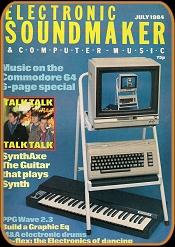
“We don’t try and make records that are obviously commercial. I think there are elements of commerciality within. ‘Such A Shame’ for example is not an obviously commercial lyric. I don’t think that changing personality through throwing a dice is a thing that people can identify with in the same way as ‘Give me a smooch’ or something.” Hmmm. You could have something there, Hollis.
“The most important thing is basing thing around songs rather than arrangements. Over the last few years very much of the music has been based around arrangement – this album is based around songs. We went in with the songs and an idea of the mood and had endless time and facilities to try different areas in arrangement.”
D’you agree Webb?
“Yeah…it would be so easy with some of the things to like stick a horn section in. Most people just copy – it’s like ‘let’s make a hit record; let’s throw that in and that’ which we’ve totally avoided on this album. It’s all been geared to the vocal and the mood of what we’ve tried to create.”
How d’you see the last couple of years in retrospect?
“I’ve seen it as an opportunity of meeting people who maybe know what you’re on about. That’s what we’ve now arrived at. We used Tim Friese-Green on the album, Tim Pope on the videos and James Marsh on the artwork. It’s just about building relationships with people.”
Sound Reinforcement
Since Simon Brenner quite, Talk Talk have been using Ian Curnow and TF-G on keyboards, Phil Ramacon on piano and Robbie McIntosh on guitar. Curnow has played with Toyah and Howard Jones amongst other and uses two Jupiter 8s and a DX7. I dragged him away from his Portastudio and Linndrum to get a few quotes. What did you use on the album?
“There’s an Oberheim OBX my JP8 and some PPG…these are all colours and stuff but the bulk of it from my end was JP8. Pete Evans, the other keyboardist is using yet another JP8, a Korg Poly-61 and a Yamaha CP80.”
How d’you go about constructing sounds?
“We try to use synths from the point of view of unnatural instruments. We try to use a synth sound as you would use a Fairlight or whatever – you don’t get a particular string sound where you say ‘oh, that’s obviously a string’, You play with the sound and make it into something that hasn’t been heard before.”
Paul, how did you get that incredible bass sound on ‘Such a Shame’?
“I played it on my lap and plucked it with a screwdriver – that’s my secret!”
What basses do you use then?
“I’ve got two. A Wal fretless and a Kramer fretless going through a Boss flanger pedal. Another secret.”
Harris had disappeared by this point so I had a crafty look at his set-up. He’s got a Rogers’s kit with Simmons SDS5 toms and effects and a Roland TR808 linked to a CR8000 drum machine which also supplies the click track.
Last word Hollis?
“Let’s just fucking move on another year, make a fucking good record that we’re all happy with…that’s the main thing. If the record sells well it’s great for us because then we’ve got the best of everything – we’re making records exactly the way we wanna make them and we’re being allowed to continue to make them because people are buying them. The most important thing about all of this is making good records – if people buy them then it’s a nice little bonus. If it doesn’t happen then it’s tough innit? It’s fucking back to the factory!”
The party’s over? Somehow I doubt it.
^ go back to topAltus Times: 27th July 1984
Now that synthesizer pop music is grabbing a firmer hold on the market, many new bands are forging a place for themselves. Two of these contenders are Icehouse and Talk Talk.
The Australian rock band Icehouse has really had it rough. When they arrived in the US in 1981 their original name, Flowers, had to be changed, since there was already an American group with that name. Their problems were compounded when critics began to accuse them of being only a cheap copy of Roxy music, one of the founding synth pop acts of the 70s.
The plain fact of the matter is that the resemblance icehouse bears to Roxy music is quite heavy. Their new album, Sidewalk, is strikingly Roxy-esque in Ira Davies’ lead vocals and Guy Pratt’s expressive, reverberating bass. They also create Roxy=like layers of atmospheric synthesizers and swaying rhythm tracks. None of these comparisons really matter, however, since Sidewalk is full of gorgeous synth pop. If a young synthesiser band had to model themselves after a more established group, Roxy music is as good a choice as any.
The influences for British synth poppers Talk Talk are not so obvious. They share certain characteristics with Low-era David Bowie and Roxy Music, but they have more in common with new synth pop acts like Duran Duran.
Most of the songs on the their new It’s My Life LP have a strong rhythm-oriented feeling that should make them popular in New Wave dance clubs. They also profited from a very interesting video of the title tune that interposes their expressionless lead singer, Mark Hollis, with bright, colourful, nature scenes.
Despite a relative lack of originality, both of these groups have a strong future ahead of them. (Bill Merrill)
^ go back to topRecord Mirror: 4th August 1984
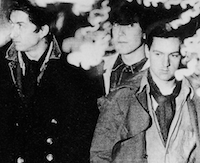
Yes, it’s them again. Like a thorn in the chart’s flesh, sticking in the rump end of the top 100, Talk Talk have returned. The pesky threesome always manage it, coming back after constant critical lashing and public misunderstanding.
This time they’re rearing their ugly heads (their words, not mine) with ‘Dum Dum Girl’ which has absolutely nothing to do with bullets or stupid women. And it’s certainly going to do nothing to discourage the image of main man Mark Hollis as a bit of a misery guts.
‘It’s My Life’, the album, seemed to send reviewers reeling into a downward spiral of despondency. Does Mark enjoy making people feel depressed ? “I don’t think I make people feel miserable, I really don’t,” he counters. “I don’t think it’s about misery…it’s soul, that’s where it all comes from. It’s sad because that’s what soul music is. You look at Otis Redding’s ‘Try A Little Tenderness’ and ‘I’ve Been Loving You Too Long’, it’s all love, innit ? It’s got to be.
“‘Dum Dum Girl’ isn’t miserable, I just think of it as an anti-prostitution song, that’s what it is. I think the songs have got to be sung with feeling, so they’ve got to be written with feeling.”
So Talk Talk seem irrevocably stuck with a doomy image. Are they really so terribly misunderstood? “I don’t even know if it matters any more if people misunderstand us,” says Mark, determinedly. “We don’t really care. This three years since we signed with EMI has been a wising-up process. We’ve met people along the way who’ve actually realized what we’re talking about, so we work with them. Like with Tim Pope and the videos, he’s a good boy, he understands where we’re at. And with the records what matters is that we make what we think is a good record.”
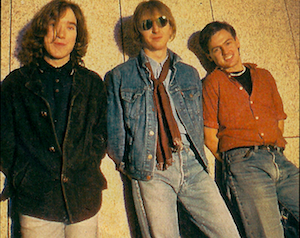
Such a shame, as the song goes. Doesn’t it stick in the craw just a teensy bit, Mark ? “It is a shame a lot of people out there don’t actually understand what the music is about. I just don’t think we’ve got time to worry about it any more. Who gives a toss, as Shakespeare once said…” Profound, Mark, profound….
“What we’re trying to do is put a load of different areas of music together. But what that means is that we don’t know what the market is for that material. To me, the best music takes as little as it can from as many different areas as it can, ‘cos nothing’s original. That’s why it’s difficult for people to know where we’re at ‘cos we do take from a wider area.”
And there’s always been this little problem of image. TT now avoid the issue by using distinctly surrealistic illustrations on all their artwork. So what on earth can Joe Public think when he looks at them ? Mark : “I don’t think many of them ever see us. we use illustrations because it says a lot more about the music than having us three on the front, smiling. I’m aware of the anonymity thing, which I think is wrong, I’m aware that people should think ‘I like that record, and he’s alright’, but that’s not what music should base itself on.”
Never mind. They seem to be getting through to somebody, somewhere, adhering to the simple formula of making records for the sake of it. “I think Eno’s been doing it for years,” Mark says, in their defence.
The way Mark works these days is heavily influenced by Luke Reinhardt’s classic novel, ‘The Dice Man’, all about a chap who puts his entire life in the hands of a pair of dice. Talk Talk’s video for their previous single ‘Such A Shame’ was done with Mark playing different roles as dictated by the dice, in a very spontaneous way. Had he ever thought of extending the dice influence into the writing of songs?
“In actual fact, there was a little bit of that in ‘Shame’, one line comes from the book, about trembling hands. I thought the imagery was good and I liked the way it related to the book directly.”
Ah, there’s more to these boys than meets the die (groan). But Mark still likes songs to say it all. In America that’s all they seem to worry about; not only have TT soared to the top of the US Dance Charts recently, but they also make a fair showing in the actual Top 100 an’ all. So what do they call ‘em in the States?
Mark: “New wave. I like that, it’s just like being called contemporary. That’s fine, it dates you to a period rather than a type. ‘Pop band’ is such a horrible description. To me it means bland, disposable, instant, not very long lasting. We’re an albums band, I only worked it out today - it’s because we don’t release our best tracks as singles!”
So Talk Talk are not a pop band, OK? And I think a man who honestly feels that smashing a tambourine to smithereens onstage is the ultimate statement has to be believed.
^ go back to topBravo: 13th September 1984
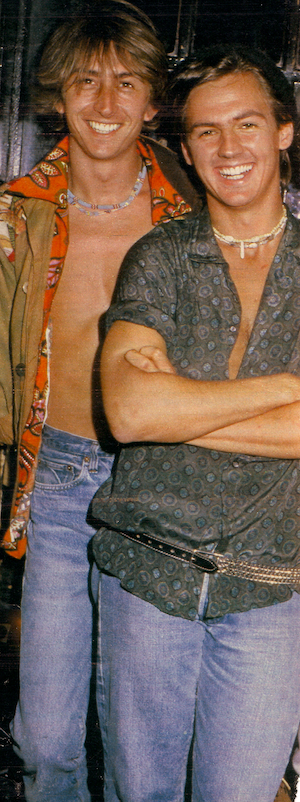
Vor den Türen des kleinen Nachtclubs ‚The Bay Street’ in dem verschlafenen Nest Sag Harbor auf Long Island bei New York standen die Fans Schlange und warteten stundenlang. Sie wollten die drei Londoner Talk Talk kommen sehen und spielen hören, von denen sie bislang nur aus dem Radio etwas wussten. Aber Talk Talk kamen nicht...
Inzwischen lagen Mark Hollis, Lee Harris und Paul Webb draußen auf der Landstraße mit ihrem Wagen fest – Reifenpanne und kein Ersatzrad im Heckkoffer!
Bis endlich ein Ersatzwagen herbeigeschafft war und die Fahrt weitergehen konnte, verging verdammt viel Zeit, und in dem Nachtclub rechnete man schon gar nicht mehr damit, dass die Engländer tatsachlich noch auftreten wurden.
Die Enttäuschung wandelte sich aber sofort in brüllende, jubelnde Freude, als, Talk Talk dann dennoch auf die Buhne stürmten – Gitarrist/ sänger Mark, mit Fransenhaarschnitt die grauen Augen fast ständig vom ‚Pony’ bedeckt, mit einer Jeanjacke über dem nackten Oberkörper. Drummer Lee mit nackter Brust hinter dem Schlagzeug, und Bassist Paul in einem grellfarbigen Hawaiihemd im Safaristil.
Wie um die Wartenden zu besänftigen, donnerte gleiche zu Beginn – unter gellendem Beifall der Fans – ‚Such a Shame’ über die Buhne, unterstutzt von zwei zusätzlichen Keyboardspielern und einem weiteren Gitarristen. Da rasteten die ersten jungen Madchen am Bühnenrand umgehend aus, besonders, wenn Lee ins einer Brillanten Technik an den Drums powerte.
Unumstrittener Liebling der Show – vor allen bei den Madchen – war natürlich Baßmann Paul Webb (22) ein Typ wie erfunden für die US-Girls, die jenseits aller Hemmungen nach ihm griffen und schnappten, wenn er spielend und tänzelnd immer wieder in allernächste Nahe des Buhnenrandes kam. Talk Talk-Boss Mark Hollis konzentriert sich so intensiv au seine Song, dass er wie entrückt, wie ‚spaced out’ auf der Bühne steht und singt ‚It’s My Life’ und das kam am allerbesten am. Neben ‚Such a Shame’ räumte auch noch „call in the Night Boy’ ab und natürlich die neuen Talk Talk-Singles ‚Dum Dum Girl’ und ‚Another Word’ bei uns aus dem letzten ‚Derrick’ wohlbekannt.
Die drei Talk Talks standen strahlend im grellweißen Licht, wahrend die drei ‚Hilfsmusiker’ im Dunkel des Hintergrunds blieben, und am Schluss war die Freude und Aufregung bei den Fans im brechen vollen Auditorium so groß und überschäumend, dass sie noch einmal ‚Such a Shame; als Zugabe serviert bekamen.
„Hatte ich gar nicht angenommen“ sagte Mark bedächtig in seiner langsame Sprechweise hinterher, „dass sich die Kids so die Kehle aus dem Hals schreien unseretwegen – die Amerikaner kannten uns doch bisher kaum...“ (Ralf Brunkow)
^ go back to topBravo: 13th September 1984
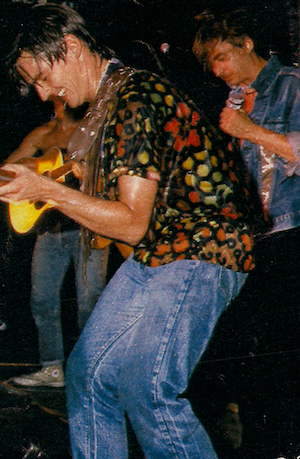
In front of the doors of the small night club, ‘The Bay Street' in the sleepy town of Sag Harbor on Long Island in New York, the queue snaked and fans waited for hours. They wanted to see and listen to the London trio Talk Talk, who had come to play; a band of which they previously knew something, although only from the radio. But Talk Talk were not there….
Meanwhile Mark Hollis, Paul Webb and Lee Harris were laid out in the road with their car – with a flat tire and no spare wheel in the rear case!
Until finally a replacement car was brought in and the trip could continue, but took a long damn time, and in the night club no one was expecting that the English group would still actually appear.
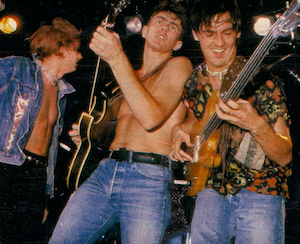
The disappointment immediately changed into a roaring, jubilant joy when Talk Talk stormed onto the stage - guitarist / singer Mark, with a fringed haircut, the gray eyes almost constantly hidden, and a denim jacket covering a bare torso. Drummer Lee bare-chested behind the drums, and bassist Paul in a brightly colored safari-style Hawaiian shirt.
To placate those waiting around, the beginning – to loud cheers of the fans – was “Such A Shame”, the band supported on stage by two additional keyboard players and another guitarist. And the first young girl immediately fainted on the edge of the stage overpowered by Lee’s brilliant technique on the drums.
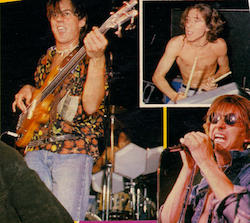
The undisputed favourite of the show – espeically with the girls – was of course, bassist Paul Webb (22) a type invented for US schoolgirls who took to him beyond all inhibitions and grabbed at him when he playfully pranced over and over again to the edge of the stage. Talk Talk boss Mark Hollis focuses so intensely on his songs that he is remote,and spaced out on stage as he sings “ It's My Life” . In addition, “Such a Shame" was also played as well as "Call in the Night Boy" and of course the new Talk Talk singles, “Dum Dum Girl” and “Another Word” well known to us from the TV show Derrick.
The three Talk Talk members were shining in the bright white spotlights, while the three auxillary musicians remained in darkness in the background, and at the end such was the joy and excitement of the fans in the full auditorium break, so great and exuberant, that it once again “Such a Shame” was played as an encore.
"What I hadn’t expected" Mark said afterwards in his cautious wasy of speaking "was that the kids would be screaming from the back of their throats - the Americans hardly knew us, but..." (Ralf Brunkow)
^ go back to topNME: 15th September 1984
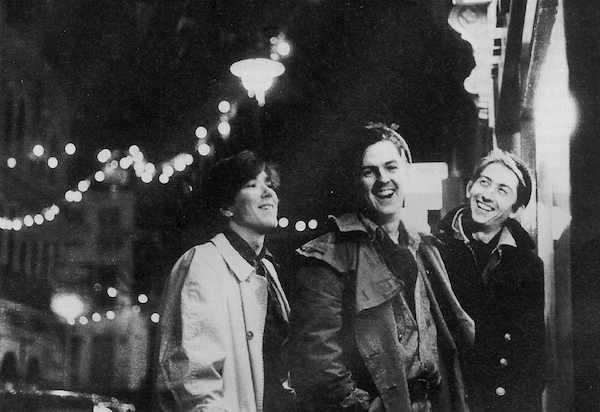
Like Alsatian guard dogs, first impressions can be useful and comforting, but they’re not always to be trusted.
A case in point, Talk Talk’s first album and their early TV slots had the needle on the ‘dismiss’ gauge rocking in the red. Ugly sub-Duran suits and a forced, characterless pop had the dumper beckoning. I had singer Mark Hollis down as a tuxedoed twit. Unreliable first impressions.
This year their second effort, ‘It’s My Life’, slipped out unheralded. Investigation prompted by something vaguely haunting in the single ‘Such A Shame’ revealed a set of songs set in bleached washes of modernism. It’s no ‘Blonde on Blonde’, but ‘Life’s’ sudden arrival in the US top 40 - salesville - confirmed the feeling that something contrary to initial expectations was afoot.
Hollis, tired from a long flight but now thankfully in human clothes, is a mixture of amazed and blasé about the record’s commercial success. “God, yeah, I was pretty surprised and very, very pleased. But then in America people are more concerned with music. Over here people are preoccupied with image and trend.”
Coming from someone who assiduously weighs everything that he says and writes, this is high grade Mad Talk. Anyway, Mark, what about your own days as a singing clothes horse?
A thoughtful silence.
“Put it like this. Since we signed the record deal, it’s been a learning process. You make mistakes and you learn from them. Early on, we were all over the place, and we were incorrectly labelled. There was a lot of serious posing going on at that time and we got tarred with the same brush.”
His relief at Talk Talk’s escape from Glamworld UK is evident. There is a seriousness in his every statement about music.
“Admiration in music comes with time. I can say that Bacharach’s a great songwriter because 20 years on I’m listening to ‘Walk On By’ and I’m thinking this is happening. Van Morrison is still a happener, still cutting it all the way down the line.”
Listening to Mark Hollis, it’s easy to see why ‘Life’ sounds so cared for, so hand polished. Its drawback is that in its determined modernity, he undersells himself, and his beloved songs, emotionally. I can hear your voice on the record, Mark, but I can’t hear YOU.
“You may be right. Emotive singers like Van and Otis Redding make very open sounding music. What we do is more closed, textural. Honestly, I often arrange the songs with people like Debussy in mind, so that the singing has to be a texture. If it were different, maybe I could sing it more emotively.” All this care, all this earnestness, all this concern with hoary old songwriting values, makes me wonder if Mark ain’t a man seriously out of time. Could he have been more suited to a time when he could decently have been, whisper it, a singer songwriter ? The suggestion causes a look of severe indigestion to sour his features. “Oh no, not that. Not that. Alright, the songs do start as just a piano and my voice, but that whole singer-songwriter thing has such a terrible sound to it. It’s as bad as being called a session man!”
I leave him as he, drummer Lee Harris and bassman Paul Webb are steeling themselves for a hefty bout of touring, glad that I’ve had the chance to correct at least one of those blurred first impressions. Say it loud - Mark Hollis is not a tuxedoed twit!
^ go back to topLive at the Ahoy Rotterdam, Holland
^ go back to top
Oor: 22 September 1984
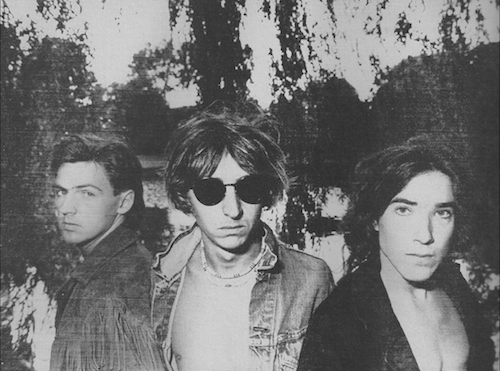
Duran Duran, Medium Medium, Allez Allez, Secret Secret, Piu Piu, Pant Pant, Bruce Burce, Sylvain Sylvain, Talk Talk. Heeft het publiek zelfs aan één heel woord niet genoeg? Zien de popsterren onder invloed van herontdekte stimulantia al bij voorbaat alles dubbel? Of Heeft het Belgische Blad Humo gelijk en nemen anno 1984 de stotteraars het heft in handen?
Een stotteraar is Mark Hollis in geen geval. Sterker nog, hij ratelt voort alsof hij elk moment in een onbedaarlijke niesbui kan uitbarsten. Gedreven door een opgevoerde straalmotor vliegen de woorden zijn stembanden af, worstelen zich door onder de donkere zonnebril en langs afgeknepen neusgaten en koesteren zich luttele momenten in een almaar killer wordende buitenlucht. In wat een verwoede poging lijkt om intelligenter over te komen dan de gemiddelde Top Popster suizen de invloeden me daarbij om de oren: Bowie, Steve Winwood, Miles Davis en Otis Redding passeren de revue, maar ook door Pharaoh Saunders, John Coltrane, Franz Kafka, Luke Rhinehard, Satie, Debussy en Charlie Chaplin deinst de man niet terug:
“Traffic, King Crimson, Spooky Tooth…Dat zijn voor mij belangrijke groepen geweest. Aan het eind van de jaren zestig was ik 13, 14 jaar, een periode in een jongensleven waarin je erg beïnvloedbaar bent. Mijn oudere broer Ed (producer-annex-songschrijver van Eddie & The Hot Rods – HvdH) draaide me altijd platen voor. Doors, vroege King Crimson, Soft Machine. Traffic ook. Die maakten elpéés. Er stonden wel singles op, maar het was meer dan twee hitjes en een hoop vullis, zoals tegenwoordig. Er was een gezonde balans tussen korte en lange stukken, er sprak een allesomvattend idee uit die platen.”
Favoriet nummer is niettemin Low Spark of High Heeled Boys, waarin Traffic heel kort een basisthema neerzet, er vervolgens een stief kwartiertje mee aan de wandel gaat, om op het eind opnieuw haar basisstatement te maken. Hollis vertelt hoe ook Talk Talk (live inmiddels uitgebreid met o.a. pianist Phil Ramacon, die ook meespeelde op de laatste elpee) bezig is geweest om de 18-maats pianosolo van Call in the Nightboy uit te bouwend tot een tien minuten durend middenstuk waar John Coltrane’s A Love Supreme in zit verwerkt. ‘A Love Supreme is voor mij de definitieve elpeetitel. Het zegt alles wat muziek zou moeten zijn. It’s My Life, de titel van onze tweede elpee, kwam het dichtst in de buurt van die ideologie, zonder haar te dupliceren. Want laten we eerlijk zijn, wat kun je nog meer zeggen over muziek dan: het is mijn leven?
Ho Ho
Voor U misschien denkt bij de dagsluiting te zijn aanbeland, slaan we onze wandelende encyclopedie even een paar blaadjes terug en lezen dat Mark in zijn intermuzikale speurtocht sinds 1981 wordt bijgestaan door bassist Paul Webb en drummer Lee Harris. Niet de meest melodieuze werkconstructie lijkt ons zo.
“Ik hou van klein” verklaart Hollis, maar dat blijkt niet te betekenen dat de groep zich live of in de studio tot de vaste driemanskern beperkt. “we hebben eerst piano en zang opgenomen, met een duidelijke indicatie van de sfeer die het nummer in zich moest dragen. Vanaf dat punt was er complete flexibiliteit. Zo hebben we Robbie McIntosh gebruikt op gitaar – hij zit nu bij de Pretenders – en Morris Pert als percussionist. Voor het nummer Tomorrow Started wilden we een blazer, die in de stijl van Pharaoh Saunders even compleet door het lint zou gaan. Daarvoor hebben we een sessiejongen in de gelederen gehaald, zo iemand die die stijl kent, die noten kan lezen en er heerlijk omheen kan fietsen. Als je al met een zevenmansbezetting werkt, krijg je te maken met het ego van al je muzikanten, je voelt je bijna gedwongen om zo’n toeteraar in elk nummer te gebruiken omdat-ie sowieso zijn kop niet kan houden en dan ben je ook nog eens afhankelijk van zijn stijl en tekortkomingen op zowel muzikaal als menselijk vlak. Nee Bedankt!”
Voor de volgende elpee loopt Hollis rond met het idee om helemaal geen drumstel, ritmebox of watdanook te gebruiken, “maar te streven naar een ruimtelijk sound, zoals die van Nelson Riddle in de jaren vijftig.”
“Het belangrijkste voor mij is verandering. Daarom zit er ook zo’n lange tijd tussen onze twee tot op heden verschenen langspeelplaten. Om die ontwikkeling de kans te geven om te rijpen. Bowie is daarbij het voorbeeld. Wat je ook van zijn platen vindt, ze zijn op zijn minst verschillend van elkaar. Het zou mij ook niet kunnen schelen als wij, net als Costello deed, opeens met een country – of coverelpee op de proppen zouden komen.”
Ja Ja
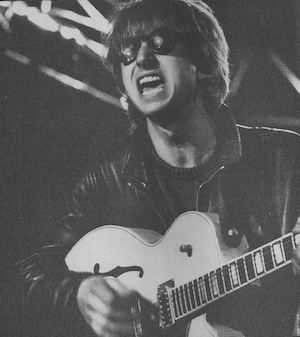
Voorlopig concentreert de rond Mark Hollis opgebouwde formatie zich echter nog op stevig in echowolken gedrenkte synthesizerklanken, waaroverheen onze man op gezwollen wijze zijn halfhuilende vocalen stapelt. In recensies in de Nederlandse bladen wed daarbij regelmatig de naam van Roxy Music-zanger Bryan Ferry uit het stof gevist. “En Fergal Sharkey” lacht Hollis, waarbij zijn oren bijna in zijn mondhoeken verdwijnen. “mijn belangrijkste invloeden zijn zonder twijfel Otis Redding, Steve Winwood en Van Morrison. Maar ook hun ideeën komen uit de soul. Soul, gospel, blues, dáár zitten voor mij de beste zangers. Wat zij doen is het uitschreeuwen van geloof en vertrouwen, maar aan de andere kant hebben ze ook hun stemmige passages. Dynamiek is erg belangrijk en daarom hou ik van soul, date werkt altijd op een uiterst dynamische basis. Ik hou van contrasten, van scherpe tegenstrijdigheden. De extremiteiten in dynamiek van Shostakovitch de compleet uitfreakende trompetsolo in Tomorrow Started Eddie Van Halen en Michael Jackson…”
Ik rem hem even af, want ik weet niet beter of uit zijn eigen vocalen spreekt vooral een desperate helpkreet. Ik wil de vergelijking met het speenvarken aan de Unox-lopende band niet maken, maar het komt wel degelijk in de buurt. En per slot van rekening ben ik wat dat betreft de expert.
“Neem dan eens een track als It’s My Life” sputtert Hollis tegen. “Dat begint in de eerste twee regels met sarcasme, dan ga je met een bepaalde toewijding naar de brug, wordt vervolgens een beetje opgewonden en in het refrein klink ik pas heel kwaad.” Ik twijfel, laat me niet overbluffen en wijs hem op de hoge, jankende toon, in feite boven zijn frequentiebereik. “Het timbre” verbetert de deskundige in kwestie. “Wat kan ik zeggen? Ja, er zit een trieste boventoon aan mijn stem Maar zelfs bij vreugde komt dat vaak voor. Ken je dat gevoel niet dat, als je blij bent, je wel kunt huilen van geluk?!”
Nu we toch bij tegenstrijdigheden zijn aanbeland: in een eerder interview verklaarde Hollis dat “een akoestische piano een instrument is waarmee je kunt communiceren. Een synthesizer is dat niet. Dus werp ik hem voor de voeten dat de band juist door synthesizers wordt gedomineerd en eis een verklaring.
“Er staan ontzettend veel synthesizers is de tweede elpee, dat is waar. Maar wij gebruiken de synthesizer voor organische klanken, niet voor synthetische. Dat wilde ik duidelijke maken. In de string-arrangementen laten we ons leiden door bijvoorbeeld de vioolpartijen bij Debussy. Een orkest inhuren kunnen we ons niet veroorloven, maar met een synthesizer kunnen we op een economisch verantwoorde wijze onze ideeën in die richting aanstippen. In feite heb ik echt een kankerhekel aan het instrument. Vooral wanneer het uitdraait op van dat piepende pinkybonk gefriemel. Hoe je de toets ook aanslaat, je krijgt altijd dezelfde reactie. Pas met de Yamaha DX-7 zit daar enige ontwikkeling in. Hopelijk zorgt dat apparaat voor meer gevoel!”
Boe Boe
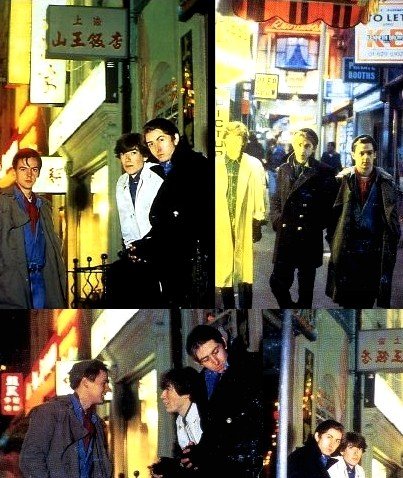
Om het waarheidsgehalte van deze uitspraak te toetsen, wijs ik even later op het intro van Talk Talk’s hitsingle Such a Shame, waarin olifanten lustig schetterden. Is dat wellicht op een Fairlight-computersynthesizer gespeeld?
“Nee, die geluiden komen gewoon uit de dierentuin” verklapt Hollis als een ware macrobioot. “We hadden wel iets in de chips zitten wat enigszins in de buurt kwam, maar prefereerden de authentieke klank. Dus hebben we onze road-manager op een dag naar de Zoo gestuurd met een taperecorder. Maar hij had de boodschap niet helemaal begrepen en kwam terug met kreten als ‘Nee, je krijgt geen ijsje’ en ‘Mag ik nog een zakje popcorn?” Dierengeluiden, ho maar! Dus hebben we het personeel wat toegestopt en zijn na sluitingstijd nog eens naar binnen gegaan. Waarom ik zo om die dierengeluiden zat te springen, weet ik niet precies meer. Wel dat ik een jaar of tien geleden eens een plaat heb gekocht waarop een groot aantal beesten stevig amok stond te maken. Dat vond ik altijd zo’n fantastisch nummer!
Klaarblijkelijk hebben we hier toch te maken met een man wiens bol niet zo hol is als zijn achternaam, want ook voor het videofilmpje van It’s a Shame kwamen de dierengeluiden goed van pas. “Veel mensen zagen het als een natuurfilmpje, associeerden het gelijk met Red De Walvis of zo…Doordat je niemand mee zag mimen en dankzij de ondertitels werd de clip een op zichzelf staand filmpje. Zelfs los van de muziek kon je de video afspelen en het bleef overeind, bracht mensen op bepaalde gedachten, kortom voegde iets toe.”
Ook de Such a Shame video is volgens dat uitgangspunt opgenomen. Het nummer is geïnspireerd door het boek ‘The Diceman’ van Luke Rheinhard, dat handelt over iemand die de dobbelstenen laat bepalen wat hij zal doen. Hij gehoorzaamt en past zijn persoonlijkheid helemaal aan. Toen we de video opnamen deden we hetzelfde. Omdat de song in dezelfde stijl geschreven was als het boek, werd de muziek de soundtrack van een kleine drie minutenfilm.
Zo te horen zou het een goed idee zijn om bij de volgende Talk Talk- langspeelplaat maar gelijk een videoversie op de markt te brengen een beetje in het verlengde van Blondie’s Parallel Lines. “Dan zou ik het liever als film aanpakken waarin de muziek zich integreert” verklapt Mark “maar het meten twee op zichzelf staande projekten blijven. Onze muziek zie ik ook slechts als backing tracks voor een film, die moet niet opgehangen worden aan een gevoel of een stemming. Het ene moment ben je namelijk zo depressief als de hel, het volgende sta je rond te springen als een kleine jongen. En vervolgens ben je razend van woede. Muziek verloopt volgens dezelfde structuren als het leven zelf. Hooguit een ietsje gecomprimeerd.”
Nee Nee
“Grappig, maar ik heb Talk Talk nooit als een dubbele naam ervaren” verklaart Mark als we ons naar de lift begeven. “Bij de voorbeelden die je in je inleiding noemde bestaat ieder woord uit twee lettergrepen, dus kun je de namen gewoon afkorten. Zodra je Talk Talk echter afkort, weet niemand meer waar je het over hebt…De naam heeft in elk geval niks te maken met Duran Duran en ander modegrillen. We hadden een nummer dat Talk Talk heette. Het lag daar en keek ons recht in het gezicht. Zag er grafisch goed uit, had kracht, leidde tot een degelijk logo en zou ons in geen enkele muzikale categorie stoppen. Wat wil je in feite nog meer?”
Nadat ik hem voor de zoveelste keer tot rust heb gemaand en hem beloof dat-ie de trein echt niet zal missen, kakelt hij nog even snel: “een bijbetekenis van het begrip Talk Talk is dat je met al die kwebbelarij niks leert. Want als je praat, kun je niet luisteren”. Deze middag heeft Mark Hollis weinig geleerd. (Hans van den Heuvel)
^ go back to topOor Issue 19: 24th September 1984
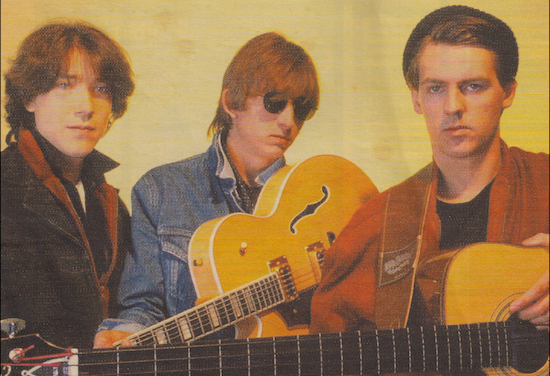
Duran Duran, Medium Medium, Allez Allez, Secret Secret, Piu Piu, Pant Pant, Bruce Burce, Sylvain Sylvain, Talk Talk. Is a single word not enough for the public? Have pop stars under the influence of stimulants rediscovered the art of doing everything twice? Or was the Belgian Journal Humo right and in the year 1984, the stutterers took control?
Mark Hollis isn't a stutterer in any case. Indeed, he rattles on as if at any moment he could explode in an uncontrollable sneezing fit. Driven as if by a jet engine words fly from his vocal cords, struggling among themselves, along the dark glasses and pinched nostrils, and bask a few moments before becoming dead air. In what seems a desperate attempt to come across as more intelligent than the average TopPop-er [NB. TopPop was the Dutch equivalent of 'Top of the Pops'], influences whizz past my ears: Bowie, Steve Winwood, Miles Davis and Otis Redding pass by, but also Pharaoh Saunders, John Coltrane, Franz Kafka, Luke Rhinehart, Satie, Debussy and Charlie Chaplin, the man does not hold back:
"Traffic, King Crimson, Spooky Tooth ... To me, these groups have been important. In the late sixties I was 13, 14 years old, a period in a boy's life in which you’re very impressionable. My older brother Ed (producer-cum-songwriter Eddie & The Hot Rods) always turned me towards records. Doors, early King Crimson, Soft Machine. Traffic too. Bands who made albums. There were singles, but it was more than two hits and a bunch of rubbish, as it is now. There was a healthy balance between short and long pieces, there was a comprehensive idea in those records. "
His favourite song is nevertheless Low Spark of High Heeled Boys, by Traffic, which briefly establishes a basic theme, then takes a fifteen-minute walk and at the end returns to its basic statement.
Hollis tells how Talk Talk (now extended live with pianist Phil Ramacon, who also played on the last album) have been working on the 18-measure piano solo of Call in the Nightboy, building up a ten-minute centerpiece where John Coltrane's A Love Supreme is processed. “A Love Supreme is for me the final album title. It says everything that music should be. It's My Life, the title of our second album, came the closest to that ideology, without duplicating it. Because let's face it, what more can you say about my music than: it's my life?”
Ho Ho
You might think for we’ve reached closure for the day, but we move our walking encyclopedia just a few pages back and read about Mark in his inter-musical quest since 1981, assisted by bassist Paul Webb and drummer Lee Harris. Not the most melodic working construction it seems.
"I love small" explains Hollis, but that doesn’t mean that the group playing live or in the studio is limited to the hard core of the three of us. "We first recorded the piano and vocals, with a clear indication of the atmosphere that the number had to have. From that point there was complete flexibility. We used Robbie McIntosh on guitar - he's now with the Pretenders - and as percussionist Morris Pert. For the song Tomorrow Started we wanted a brass instrument, in the style of Pharaoh Saunders. Therefore you can bring a session man into the ranks, someone who knows that style, who can read and play around. If you already work as a seven man band, you have to deal with the ego of all your musicians, you almost feel obliged if you had a flautist to use him in every song because he never would shut up about it, and then you're dependent on his style and shortcomings on both a musical and human level. No Thanks!”
For the next album Hollis walks around with the idea of not having drums, or using a rhythm box or whatever, "but to seek a spatial sound like those of Nelson Riddle in the 1950s."
"The important thing for me is change. Therefore, that’s why there’s such a long time between our two LPs to date. For this development gives us the chance to mature. Bowie is an example. Whatever you make of his records, they are at least different. I wouldn’t care if we, like Costello did, suddenly did a country album – or come up with an album of cover versions. "
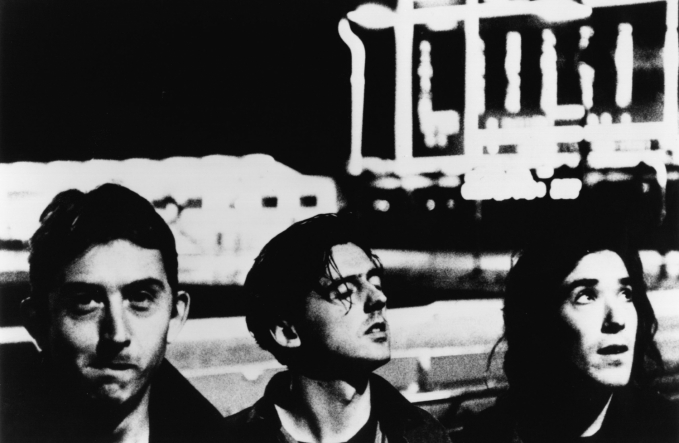
Yes Yes
For now the focus of the formation built around Mark Hollis still accumulates clouds drenched in echoing synthesizer sounds, over which our man puts down half-howling vocal tracks. In reviews in Dutch newspapers the name of Roxy Music singer Bryan Ferry is regularly fished out. "And Fergal Sharkey" Hollis laughs, the corners of his mouth nearly reaching his ears.
"My main influences are undoubtedly Otis Redding, Steve Winwood and Van Morrison. Their ideas come from the soul. Soul, gospel, blues, for me, that’s where the best singers are. What they do is cry out in faith and trust, but on the other hand, they also have their serene voices. The Dynamic is very important and that’s why I love soul, it always works on a highly dynamic basis. I love contrasts, sharp contradictions. The extremes in dynamics of Shostakovich, the complete freakout trumpet solo in Tomorrow Started, Eddie Van and Michael Jackson ... "
I break off a bit, because I don’t know him well, and judging from his own vocals they sound especially like a desperate cry of help. I want to make the comparison with the suckling pig on the conveyor belt of a Unox assembly plant, and indeed I come close. And after all I am with the expert.
"Take a track like It's My Life Hollis splutters again. "It begins with the first two lines of sarcasm, then you get with a certain calmness to the bridge, then a little excited, and in the chorus I sound just very angry." I doubt it, don’t let myself be fooled, and assign it a high, whining tone, in fact, over its frequency range. "The timbre" opines the expert in question. "What can I say? Yes, there is a sad overtone to my voice. But even that often comes with joy. You know that feeling that if you’re happy, you can cry with happiness? "
Speaking of discrepancies, we have arrived at one: Hollis said in an earlier interview that "an acoustic piano is an instrument on which you can communicate. A synthesizer isn’t. So I throw at his feet the accusation that the band is just dominated by synthesizers and demand an explanation.
"There are an awful lot of synthesizers on the second album, that's true. But we use the synthesizer for organic sounds, not synthetic. I want to make that clear. In the string arrangements, we are guided by composers for the violin like Debussy. We can’t afford an orchestra, but we can use synthesizer in an economically responsible way, and move in that direction. In fact, I really hate the instrument. Especially when it turns into that ‘squeaky bonk plinky fumble’. However you hit the key, you always get the same reaction. Only with the Yamaha DX-7 is there some development. Hopefully that device will deliver more feeling! "
Boo Boo
To test the veracity of this statement, a little later I point to the intro to the hit single Such a Shame, where elephants sound merrily. Is that perhaps a Fairlight computer synthesizer playing?
"No, that sound just comes from the zoo" reveals Hollis, a true biologist. "We had some sounds in the synths that came close, but preferred the authentic sound. So one day we sent our road manager to the zoo with a tape recorder. But he hadn’t understood the message and came back with cries of "No, you’re not getting an ice cream” and “Can I have a bag of popcorn?" But animal sounds? No! So we gave the staff some money and after closing time we went in again. Why we used animal sounds, I don’t know exactly. Well about a decade ago I bought a record on which a large number of animals were featured going out of their minds. I always thought it was such as fantastic song!
Apparently we have yet to deal with a man whose head is not as hollow as his surname [NB This is a bad pun on 'Hollis'! in Dutch 'hol is' means'hollow'], because also in the video of It’s My Life the animal sounds came in handy. "Many people saw it as a nature film, and associated with the Save the Whale or something ... Since nobody saw us mime and thanks to the subtitles, the clip became a self-contained movie. Even apart from the music you could play the video and it remains stand-alone, it inspired certain thoughts in people, it added something. "
“The Such a Shame video is recorded under that premise. The song was inspired by the book 'The Diceman' by Luke Rhinehart, dealing with someone who lets the dice decide what he’ll do. He obeys and submits his personality completely. When we got to the video recording we did the same. Because the song was written in the same style as the book, the music was the soundtrack of a small three-minute film. "
Sounds like it would be a good idea for the next Talk Talk LP, to release an accompanying version in the way of Blondie's Parallel Lines. "I’d prefer to tackle it as a movie in which the music is integrated" reveals Mark "not as two isolated projects. With our music, I only see it as a backing track for a film that’s not hung on a feeling or mood. One moment you're as depressed as hell, the next you are jumping around like a little boy. And then you get angry. Music follows the same structures as life itself. Slightly compressed at most. "
No No
"Funny, but I never thought of Talk Talk as a duplicate name," explains Mark when we go to the elevator. "The examples you mentioned in your introduction there are words of two syllables, so you can just abbreviate the names. If you chop up Talk Talk however, nobody knows what you’re talking about ... The name has certainly nothing to do with Duran Duran and other fads. We had a song called Talk Talk. It was there and looking us straight in the face. The graphics looked good, it had power, led to a decent logo and would sit us in any musical category. What more do you actually need? "
After I admonished him for the umpteenth time to rest and urged him to promise that he's not really going to miss the train, he quickly cackles: "one connotation of the concept of Talk Talk is that by only talking you learn nothing, 'cos when you talk you don't listen." This afternoon, Mark Hollis learned little.
The Michigan Daily: 6th October 1984
Hail to the next great songwriter of the generation, a British lad named Mark Hollis who looks as if he’d be checked for identification at any bar he walks into, but who possesses enough songwriting and vocal talent to challenge anybody else on the music scene today. Mark has bee in two different groups in the last three years, the former one, Talk Talk (a lively and upbeat synthesized sounding band) and the latter one Talk Talk (a very tight acoustic sounding band).
The former group Talk Talk first made waves in the US when they toured with Elvis Costello during the summer of 1982. With all the band members dressed in white shirt/black tie uniforms and the stage covered with long cages of aluminium that completely separated all the personnel, the group presented itself as a gimmicky new fad whose generic fashion was as important as the music.
The latter group, Talk Talk, made even more waves in the US when they toured with the Psychedelic Furs this past summer. This tour featured a conventional stage with band members sporting whatever attire suited them at the moment. This group was more serious about the music and more mature in its approach.
The new Talk Talk album, It’s My Life, features three new musicians, only one of which stayed in the band. Robbie MacIntosh, the Pretenders new lead guitarist (and potential death curse victim) handles all the guitar work on the LP and plays all his licks and fills acoustically.
Morris Pert, percussionist extraordinaire who has worked and travelled extensively with Peter Gabriel, handles the same chores on the Talk Talk album and proves again his phenomenal versatility. The percussion mixes perfectly into the music without dominating the general sound or conspicuously showing off in the background.
The record is produced by Tim Friese-Green, a new group member who also plays keyboards and another young phenom who resembles closely Steve Nieve (the Attraction) in his use of quick fills on a grand piano and bizarre orchestration techniques. Tim F-G recently produced Blue Zoo, a pop group that never quite made it in this country (what else is new?).
Despite the presence of an all-star line up Mark Hollis (lead vocalist) still steals the show. His melodies are soothing, beautifully fragmented, and carefully worked into the music. Hollis is a refined and classy version of REM’s Michael Stipe, yet still a cheerful chap with a good sense of humour and a tremendous amount of personal warmth who makes every listener feels like a best friend sharing his intimate secrets. Hollis, who played some guitar in concert, has emerged as an important force in music, a rare breed who remains apolitical and soft-spoken enough not to isolate anybody from his art.
The It’s My Life album is good for any mood or situation, mellow or exciting. We’re sure to see more good things from Mark in the future. (Andrew Porter)
^ go back to topBravo 15th November 1984
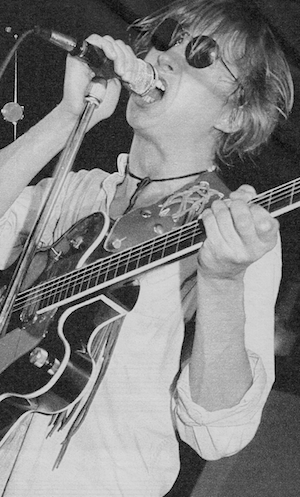
Es ist fast nach jedem Talk Talk Auftritt das gleiche: Die Roadies sammeln armeweise BHs von der Bühne. Die Girls sind so heiß auf sänger Mark, daß sie ihn mit den intimen Kleidungsstücken bombardieren.
Als er das zum ersten Mal erlebte, war Mark verblüfft und richtig froh, daß er so bei den Fans eingeschlagen hatte. Er fädelte die Dinger alle liebevoll auf eine Leine und hängte sie als Trophäen im Bad seines Hotelzimmers auf.
Inzwischen bringen ihn die Reizwäsche-Geschosse nur noch in Verlegenheit. Wenn sie angeflattert kommen, reagiert er nicht mal mehr mit einem Blick darauf.
„Ich weiß nicht, warum die Girls, mit BHs nach mir werfen“ beschwert er sich, „ich habe sie nie mit einem Wort dazu ermuntert. Sie sollten sich ihre Wasche lieber für Bands aufheben, die da echt drauf stehen.“
Sexuell interessiert Mark keins der Girls im Publikum, auch wenn sie noch so schnuckelig aussehen. Er lebt seit acht Jahren mit seiner Freundin Flick zusammen und ist bisher noch kein einziges mal „fremdgegangen.“
„Flick ist für mich der wichtigste Mensch auf der Welt. Gedanken an andere Frauen sind mir nie gekommen“ behauptet er.
Wer Talk-Talk nach sanften Songs wie ‚Such a Shame’ oder 'Dum Dum Girl’ einschätzt und auch live eine Softie-Band erwartet, liegt ganz falsch. Talk Talk hauen aufs Blech, daß der Schweiß bei Musikern und Fans in Strömen rinnt und die Hallenwände wackeln.
Talk Talk-Boß, -Sänger und Gitarrist Mark Hollis Läßt, oberflächlich betrachtet, zwar nicht die ganz groß Action raus. Sein Aktionsradius betragt etwa 60 Zentimeter um sein Mikrofon. Kleine, aber heftige Drehungen aus der Hufte oder den Schultern sind alles an Bewegung, womit er seine Songs unterstreicht.
Mark konzentriert sich total auf seine Texte und gesangliche Power. Trotzdem ist er so voll dabei und aufgeputscht durch die ganze Konzertatmosphäre, daß er auch bereits nach der zweiten Nummer patschnass geschwitzt ist.
Hemden trägt Mark nur selten bei Bühnenauftritten. Denn im Elfer des Gefechts fetzt er immer alle Knöpfe ab oder reibt das Kleidungsstück ganz in Stücke.
Das einzige, worauf der Sänger auch in den wildesten Ekstase-Augenblicken genau achtet, ist die grüne Brille auf seiner Nase, hinter der er sich versteckt. Die verrutscht keinen Millimeter.
Die grüne Brille, die Mark nicht gerade hübscher macht, ist mehr als eine Marotte des Talk Talk Kopfes. „Das Ding kaufte ich mir Anfang des Sommers in New York“ erklärt er.
„Für mich war das eins der erstaunlichsten Erlebnisse das sich je hatte. Ich setzte die Glaser auf die Nase und im selben Augenblick war die Welt wie verwandelt. So ruhig und friedlich. Alles, auch die Leute neben mir und der Verkäufer, der auf mich einredete, rückte weiter weg, auf Abstand. Ich fühlte mich schlagartig besser.“
„Lange Blicke fine ich äußerst anstrengend „erzählt er“ wenn ich jemanden mal für ein paar Sekunden in die Augen sehe, weil er mich interessiert, kommen von dem sofort Blicke zurück und nicht nur freundliche. Die Stimmung wird dann augenblicklich total gespannt.“
Mark ist ein typischer Einzelgänger. Wenn andere Menschen ihm zu nahe auf den Leib rücken, fühlt er sich schnell direkt bedrängt.
Farben wirken auf Mark äußerst intensiv. Das Friedliche grüne Licht, in has seine Brille die Welt taucht, ist nicht der einzige Fall, wo er die psychische Wirkung von Farben nutzt. Zum Songschreiben setzt er die Brille ab. Sämtliche Talk Talk Hits entstanden in Marks Kompositionsraum. Woanders fällt ihm nichts ein.
Das Zimmer ist vollkommen leer bis auf einen Flügel. Wände und Decken leuchten in aggressive Orange, das einen beim Betreten des Raums förmlich anspringt.
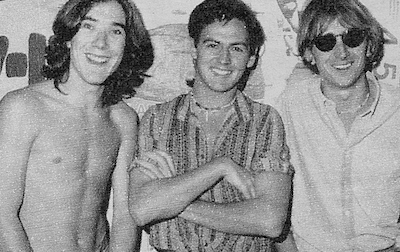
Kein Bild, kein Poster lockert die Sonnenaufgangsfarbe auf. Orange törnt Mark so an, daß er nach einer Viertelstunde am Flügel alle Alltagsgedanken vollkommen vergißt. Song-Ideen fliegen ihm dann einfach zu.
Ein Talk Talk-Konzert ist vermutlich die einzige Gelegenheit, wo man erleben kann, wie Paul Webb, die stille Mann am Baß, mal ganz aus sich rausgeht.
Paul, der auf Partys und Disco-Besuchen kaum aus seinem Sessel hochkommt, ist der Action-Mann, wenn die Band live spielt.
Im heißen Bühnenlicht, angefeuert von der tobenden Menge der Fans, wird er plötzlich zum Tanz-As.
Er lässt locker seine Huften kreisen, bewegt sich mit schnellen, rhythmischen Schritten auf die Fans vor der Buhne zu, als wollte er such auf sie stürzen wie ein Tiger, und steppt oder hopst anschließend in komischem Duck-Walk wider zurück
Wenn er und Drummer Lee Harris sowie drei Gastmusiker die Song abspulen – übrigens einen ganzen Zacken schneller als auf der Platte – wird er high. Pauls breitem Grinsen, das wahrend der Show höchstens mal für Sekunden von seinem Gesicht weicht, kann man ansehen, wie zufrieden er mit sich und seinem Job ist. (HJ Riemann)
^ go back to topBravo: 15th November 1984
It's the same after almost every Talk Talk show: the poor roadies collect bras from the stage. The girls are so hot on singer Mark that they bombard him with the intimate garments.
When he first saw it happen, Mark was surprised and really glad the fans were so taken with him. He threaded all the things lovingly on a line and hung them up as trophies in the bathroom of his hotel room.
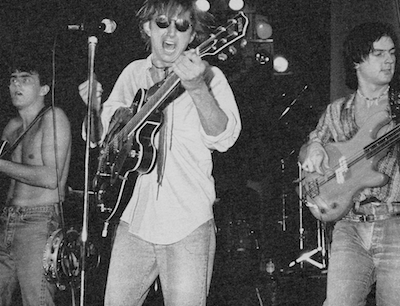
These days the bullets of sexy underwear only bring light embarrassment. When they come fluttering, he doesn’t even respond with a look.
"I don’t know why the girls throw bras after me," he complains, "I've never said a word to encourage it. They should save their washing for bands that are really excited about it”.
Mark isn’t sexually attracted to any of the girls in the audience, even if they look ever so cute. He’s lived for eight years with his girlfriend Flick, and has not yet “gone astray” once. "Flick is the most important person in the world to me. Thoughts of other women have never crossed my mind" he claims.
People who know Talk Talk for gentle songs like 'Such a Shame' and 'Dum Dum Girl' and who expect a softie live band, are quite wrong. Talk Talk are welded from a metal sheet, with both musicians and fans pouring sweat and shaking the walls of the hall.
Talk Talk boss, singer and guitarist Mark Hollis can, superficially at least seem stepped-back from the action.. His operating range amounts to about 60 inches around his microphone. Small but violent twists of the hips and shoulders are the total of his movement, with which he emphasises his songs.
Mark is totally focused on his lyrics and vocal delivery. Still, he is so full-on and pumped-up by the whole atmosphere of the concert, he is already soaked in sweat after the second number. Mark rarely wears shirts for stage appearances. Because in the heat of battle he always rips off all the buttons or rubs the garment to pieces.
The only thing the singer pays respect to in the wildest moments of ecstasy are the green spectacles on his nose, behind which he hides. They slip not an inch.
The green glasses that Mark wears are not just aesthetic, but more a personal quirk of the Talk Talk leader. "I bought the things at the beginning of the summer in New York," he explains.
"For me, it was one of the most amazing experiences I ever had. I put the glasses on the face and at that moment the world was transformed. So quiet and peaceful. Everything, even the people next to me and the seller talking to me, moved further away, were set at a distance. I felt instantly better. "
"I find stares extremely tiring" he says, "when I see someone’s eyes staring directly at me for a few seconds, because he’s interested in me, I stare back immediately and not always in a friendly way. The tension is then instantly raised."
Mark is a typical loner. If people get too physically close to him, he quickly feels under direct pressure.
Colours affect Mark very intensely. The peaceful green light of his glasses through which he engages with the world, is not the only case where he uses the psychological effects of colour. He takes off the glasses to write songs. All Talk Talk hits originate in Marks composition room. Elsewhere, nothing comes to him.
The room is completely empty except for a corner. Walls and ceiling lights glow in aggressive orange, which are turned on when entering the room. No pictures, no posters break up the sunrise glow. Orange vibes affect Mark so much that after a quarter of an hour at the piano everyday thoughts are completely forgotten. Song ideas then fly easily to him.
A Talk Talk concert is probably the only time where you can see how Paul Webb, the quiet man on bass, comes completely out of his shell.
Paul, who barely gets out of his chair at parties and discos, is the action man when the band plays live. Under the hot stage lights, fired by the madding crowd of fans, he will suddenly become a grade-A dancer.
He lets loose by circling his hips, moving with quick, rhythmic steps towards the fans in front of the stage as if he were seeking to pounce on them like a tiger, and then hops backwards from them in a comical duck-walk.
When he and drummer Lee Harris and three guest musicians reel out the songs - a great deal faster than on the record – Paul has a wide grin, which deviates from his face for at most a few second during the show, and you can see how happy he is with himself and his job.
^ go back to top
Vogue Italia: Lug/ago 1985

Post-punk, new jazz, fantasy pop, glamour rock, nuovi psichedelici: le etichette inventate dalle riviste specializzate e dai press-agent delle case discografiche non riescono a tenere dietro al moltiplicarsi di rockbands che, soprattutto in Inghilterra, prolificano più che negli anni Sessanta. Ma se in passato i filoni musicali erano perfettamente identificabili e autonomi, oggi questi gruppi trascendono il significato tradizionalmente legato alla musica. Non solo le musiche sono più ibride, ambigue spesso intercambiabili, ma gli elementi extramusicale hanno assunto ormai un’importanza enorme, talvolta eccessiva. Look, moda, video, cinema, letterature, pubblicità: non ci sono più confini. Anche la fama, il successo sono fenomeni brevi, improvvisi e enigmatici. In questo servizio perenti amo alcuni gruppi inglesi tra i più amati di oggi.
I Talk Talk sono riusciti a creare una miscela giusta di realismo, di freschezza e immaginazione nello stesso tempo, sviluppando il tutto con un’accattivante e solida sensibilità pop. In quest’affermazione piuttosto sintetica ma esauriente di un noto settimanale specializzato inglese, c’e tutta l’essenza dell’attuale fortuna dei Talk Talk.
I tre ragazzi britannici, visti anche da noi al Festival di Sanremo e poi in un applaudito tour, hanno una caratteristica rara tra i gruppi dell’odierno panorama della musica giovanile. Non sono studiati a tavolino, non hanno un look particolare, sembrano tre tipi comuni, allegri, fracassoni, amici tra di loro, che bevono birra e corrono dietro alle ragazze. E anche la musica non ha nulla de eccezionale: non è cioè particolarmente originale. È un elettropop molto scandito e comunicativo, adattissimo per il ballo. I Talk Talk non seguono nessun filone specifico, nessuna moda, ma hanno creato finora una musica all’insegna della spensieratezza, fatta regola d’arte.
Mark Hollis vocalista, Paul Webb bassista e Lee Harris batterista si sono battezzati Talk Talk nell’aprile 1981 e, settembre successivo hanno data il primo concerto a Londra. Quello e altri concerti tenuti subito dopo, a grande richiesta, hanno richiamato un vivo interesse attorno al gruppo. Lusinghiere accoglienze da parte degli esperti, trasmissioni alla radio, in TV e infine vengono scritturati da una delle majors tra le multinazionali del disco.
Il primo LP s’intitola The Party’s Over, ed esce in Inghilterra nel luglio del 1982. In tre fanno subito una lunga tournee e il singolo Talk Talk ha un buon successo anche negli Stati Uniti. Ma Hollis e compagni non sono del tutto soddisfatti. “Il primo LP è stato il processo di registrazione di noi stessi, di come eravamo allora. I brani e gli arrangiamenti rimasero intatti, tutto fu eseguito secondo un rigido schema già stabilito tempo addietro.”
Solo con il secondo album It’s My Life, uscito nel febbraio 1984, la musica dei Talk Talk è diventata più fluida, ricca e tecnologicamente sofisticata. I ragazzi hanno imparato a servirsi di tutte le risorse di un moderno studio di registrazione, hanno usato arrangiamenti più elaborati con l’intervento di altri, ottimi musicisti e il risultato è piaciuto anche al pubblico più esigente. Anche se la musica del Talk Talk e semplice, un pop molto vicino al l’easy listening, nei loro dischi si riconosce una sapienza e un livello artigianali piuttosto elevati,
Interrogato sulle influenze musicali sue e degli altri, Mark Hollis dice “Devo pensarci. Posso dirti che mi piace molto Miles Davis. Ma dato che canto, devo fare senz’altro il nome di Otis Redding. Lui e il mio favorito, perche avevo tutto in termini di soul, nel gospel, nel dinamica vocale, nel feeling.”
Oltre alla musica, i tre hanno gusti piuttosto tranquilli. Paul ha una passione speciale per la pesca. Lee colleziona francobolli. E Mark da una riposta più poetica: “A me forse piacciono gli estremi. Ora mi viene da pensare a spazi deserti di gente. Sai, la nostra vita è cosi frenetica che adesso vorrei vivere in un posto cosi.
E poi mi sembra importante cavarsela in due mondi diversi, magari contrastanti. E la legge degli opposti, no?” Dopo il grande successo da noi, è stato pubblicato It’s My Mix, un minialbum solo per l’Italia. Contiene sei dei maggiori hit dei Talk Talk, in versione rimissata e a lunga durata: Why is it so hard?, Talk Talk, My Foolish Friend, It’s My Life, Dum Dum Girl e Such a Shame. Nel frattempo, la band sta preparando un disco nuovo che dovrebbe uscire il prossimo autunno.
^ go back to topVogue Itlay: July/August 1985
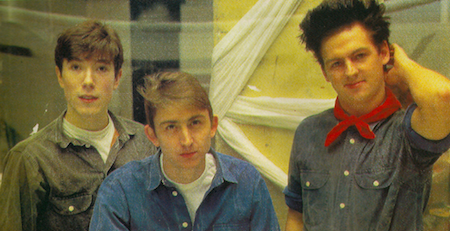
Post-punk, new jazz, pop fantasy, glamour rock, new psychedelic: labels invented by the magazines and the press agent of record companies cannot keep up with the proliferation of rockbands that, especially in England, proliferate more than in the 60s. But if past trends were perfectly identifiable and independent, today these groups transcend the meaning traditionally linked to the music. Not only is the music more hybrid, interchangeable and often ambiguous, but the extra-musical elements have already assumed enormous – sometimes excessive - importance. Image, fashion, video, film, literature, advertising: there are no more boundaries. Even fame itself, success phenomena are short, abrupt and enigmatic. Here are some of the most popular British bands of today.
Talk Talk have managed to create a right blend of realism, freshness and imagination, developing with all an attractive and solid pop sensibility. In this rather concise but complete description by a specialist English weekly, good fortune is the whole essence of Talk Talk
The three British boys, seen by us at the Sanremo Festival and then in an acclaimed tour, have a rare feature among the youth groups of today's music scene. They are not designed, don’t have a particular image, look like three normal types, cheerful, noisy, friends, who drink beer and chase after girls. And the music has nothing of greatness: that is, it’s not particularly original. It is a very marked and communicative electro, perfect for dancing. Talk Talk don’t follow any specific trend, nor fashion, but so far have created music with a light-heartedness, made a workmanlike manner.
Vocalist Mark Hollis, bassist Paul Webb and drummer Lee Harris were baptized Talk Talk in April 1981 and the date of their first concert in London followed in September. That and other concerts held soon after, by popular demand, have attracted great interest around the group. A flattering reception from the experts, broadcasts on radio, on TV and then they come in on one of the competitions between the multinational record companies.
The first LP entitled The Party's Over, came out in England in July 1982. In just three years they have undertaken a long tour and the single Talk Talk has worked successfully in the United States. But Hollis and his companions are not completely satisfied. "The first album was the recording process of ourselves, how we were then. The songs and arrangements remained intact, everything was done according to a rigid pattern already established some time ago. "
Only with the second album It's My Life, released in February 1984, has the music of Talk Talk has become more fluid, rich and technologically sophisticated. The boys have learned to use all the resources of a modern recording studio, they used more elaborate arrangements with the intervention of other, good musicians, and the results were enjoyed by the most demanding audiences. Although the music of Talk Talk is simple, very close to a pop easy listening, it’s not hard to recognize their wisdom, and rather high level craft,
Asked about his musical and other influences, Mark Hollis says "I think about it. I can tell you that I really like Miles Davis. But as I sing, I have no doubt about the name of Otis Redding. He’s my favorite, because of having everything in terms of soul, the gospel, the dynamic voice, the feeling. "
Besides music, the three’s tastes are pretty tame. Paul has a passion for fishing. Lee writes plays. And Mark one answer more poetically: "I might like the extremes. Now I'm thinking of people in empty spaces. You know, our life is so hectic that I now live in a place like this.
“And then I think it is important to cope in two different, even conflicting, worlds. It’s the law of opposites, isn’t it?" After the great success they’ve had, there has been released It's My Mix, a mini album only for Italy. It contains six of the biggest hits of Talk Talk in remixed and extended versions: Why is it so hard?, Talk Talk ,My Foolish Friend, It's My Life, Dum Dum Girl, and Such a Shame. Meanwhile, the band is preparing a new album due for release this autumn.
